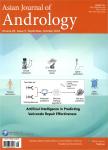Localization of epididymal protease inhibitor in adult rat and its transcription profile in testis during postnatal development
Localization of epididymal protease inhibitor in adult rat and its transcription profile in testis during postnatal development作者机构:Key Laboratory of Reproductive Medicine Institute of Toxicology Nanjing Medical University Nanjing 210029 China Laboratory of Reproductive Medicine Department of Urology First Affiliated Hospital of Nanjing Medical UniversityNanjing 210029 China
出 版 物:《Asian Journal of Andrology》 (亚洲男性学杂志(英文版))
年 卷 期:2009年第11卷第6期
页 面:731-739页
核心收录:
学科分类:0710[理学-生物学] 07[理学] 08[工学] 09[农学] 071006[理学-神经生物学] 071007[理学-遗传学] 0901[农学-作物学] 0836[工学-生物工程] 090102[农学-作物遗传育种]
基 金:supported by grants from the National Eleventh-Five Science and Technology Support Program of China 国家973计划
主 题:expression pattern postnatal development rat Eppin spermatogenesis and maturation
摘 要:To investigate the expression pattern of rat Eppin (epididymal protease inhibitor; official symbol Spinlwl), we detected mRNA transcripts and subsequent protein translation of Eppin in several sorts of tissues by RT-PCR and westem blotting. Then immunohistochemistry was performed for more detailed observation. The testicular transcription level was monitored by real-time PCR throughout postnatal development. We found that rat Eppin was specifically expressed in the testis and epididymis. The testicular transcription was slight in neonatal (1-day) and infantile stages (5-, 7- and 10-day). It increased sharply thereafter, with maximum expression level (about 38- fold compared with that of 1-day old rat) detected in prepubertal stage (15-day). Then a slightly declined but stable level (about 20-fold compared with that of 1-day old rat) was kept in pubertal-early adult (30-day) and adult (60-day) stages of postnatal maturation. In the adult rat, EPPIN protein was mainly localized in the elongated spermatids and epididymal epithelial cells. Sperm in the epididymal duct were all covered with EPPIN and its level kept constant during incubation under conditions used to achieve capacitation. Its stage-specific expression in the testis suggests that EPPIN may be important during spermatogenesis especially for the spermatid elongation. The abundant production of epididymal EPPIN indicated indirectly that it might play a role in the function of the epididymis.



